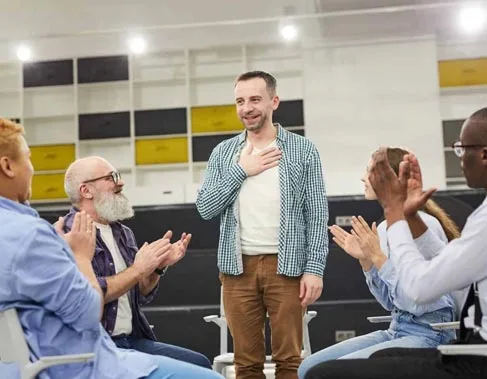When you or a loved one has an alcohol or drug problem you may find it difficult to address. You can treat dependence even though it is a disease, and long term recovery is possible through professional rehab intervention programs.
We will detail how recovery from addiction is possible for you or a loved one if an integrated treatment approach is explored.
What is Addiction Rehab (Rehabilitation)?
When we refer to ‘rehab’ for addiction, it includes the psychological interventions and medical treatments required to tackle dependencies on substances such as prescription drugs and illegal drugs including meth.
Rehab treatment offers the best chance of long term success when it is customized to the unique needs of the client and includes medically-managed detoxification, inpatient or outpatient programs, and relapse management techniques also known as aftercare.

Facts & Statistics about Addiction in Merced
Prevalence of Substance Use Disorder, by Drug Type
(IN THOUSANDS)
- 2,7578.5%Any Substance
- 2,0886.4%Alcohol
- 1,0683.3%Ilicit Drugs
- 2060.6%Pain Medication
Drug- and Alcohol-Induced Deaths by Age Group, California, 2016
- Alcohol-Induced
- Drug-Induced
- 18 to 250.5
- 9.6
- 26 to 354.3
- 13.9
- 36 to 6424.2
- 22.9
- 65+23.7
- 9.4
Drug Use, by Selected Type and Age Group California, 2015 to 2016
- 12 to 17
- 18 to 25
- 26+
- Marijuana*13.2%
- 34.0%
- 13.5%
- Misuse of Pain Medications3.5%
- 8.0%
- 4.3%
- Cocaine0.8%
- 7.2%
- 1.8%
- Heroin0%
- 0.4%
- 0.2%
What are the treatment options available in Merced?
Through consolidating treatments, the hidden causes of drug dependence can be addressed and healed. Although symptoms of addiction need to be managed, life skills will also be learnt in order to focus on the primary causes of your substance misuse.

Private Residential Programs
Remaining at a addiction rehab center and having all of your treatments there is what’s known as a residential rehab program. A primary benefit is the ability to receive holistic support and treatment all day. When you live at a rehab center you will be away from most of the triggers in your home environment that may encourage your substance misuse.
You will be less susceptible to relapse if you finish your addiction treatment program in a controlled facility where the environment is supportive.
When you struggle with a strong substance dependency, or if you suffer from a dual diagnosis or co-occurring illness, a residential rehab program is best. We understand that the first year of recovery can be pivotal and after a residential treatment program, you need to stay focused to maintain sobriety. Upon completion of your inpatient addiction treatment program, you must transition towards further independence as you build goals for your new sober life.
Do You Need Help?
Our addiction advisers are here to help you.

Sober Living Programs
Support and guidance are provided during a sober living program in order to control your future more effectively. Sober living programs include:
- A house manager who will visit you daily
- Advising you on the best way to behave in recovery
- Fostering necessary friendships with others in recovery who recognize your challenges and your experiences
Outpatient Programs
Outpatient rehab programs are flexible because you can continue your job or life obligations, while visiting the rehab facility for treatments.
Outpatient programs assist you with:
- Education on the misuse of drugs
- Group therapy and individual counseling as drivers for therapeutic intervention – You can expect to be enrolled in an outpatient program for a minimum of three months, and may continue the program for longer than a year if necessary.
Detox Only Programs
Taking part in a drug or alcohol detox program is a crucial stage in rehab as it helps address your physical dependency by eliminating substances from your system. During the detox phase you will develop withdrawal symptoms as the system starts to function independently of the substance it was dependent on.
This process of detoxification starts the rehab process, which continues as you face the reasons for your addictive behavior so that you can avoid repeating the cycle in the early stages of recovery. Many substances drive symptoms of withdrawal and cravings for a period of time after they have been cleared from your system. In rehab therapy you will learn the coping skills for long-term recovery, so that you can limit the possibilities of relapse in the future.
Paying for Private Treatment
If you choose private options, you can pay with your own funds or claim through your healthcare policy. Many private insurance companies will contribute to a portion of the costs associated with a rehab program, which includes a medical detox, therapy program and aftercare provisions. The type of cover offered will differ based on the details of your policy as well as your provider’s terms and conditions.
You should determine how much cover you can claim before you register for a treatment program. To find out what you could be entitled to, click on our Verify Your Insurance page.
If you decide not to claim against your private health insurance, you have to pay for your rehab out of pocket. Some treatment providers may offer payment plans to clients who find the costs unaffordable upfront.
State Funded Programs
If you are caught in the cycle of substance dependence and do not have the funds to pay privately for it, you can opt for a state-funded rehabilitation program.
Assistance can be provided with funds available from Medicaid and federal/state budgets, these types of programs can subsidize your recovery including:
- Services for a safe detox (medically-managed if required.
- Rehab treatments and aftercare support services
These types of programs are designed to help those on tight budgets or those with no health insurance. To apply you will need:
- Proof of living arrangements
- Proof of earnings
- Details about your addiction from your medical history and information about your substance issues
- Proof that you have the legal right to live and remain in the US
You can find out more about the application process here: https://www.grants.gov/
This pdf document contains your state agency’s contact details.

The following state-funded addiction rehab programs are available in Merced:
Aegis Treatment Centers LLC
1343 West Main Street, Suites A and B , Merced, CA 95340
209-725-1060
https://pinnacletreatment.com/aegis/Behavioral Health and Recovery Servs Recovery Assistance for Teens
1275 B Street, Merced, CA 95340
209-381-6880
County Merced
Maintaining Addiction Recovery in Merced
Sustaining addiction recovery can feel difficult once you embark on your new journey outside of rehab. When you were in rehab the environment was controlled and you had support from professionals. Once you leave rehab there may be new triggers that put your coping skills to the test. Long term recovery is more challenging if you have a severe dependency or if you return to your new life without social support structures in place. Relapse can happen if you don’t have the appropriate aftercare or support to guide you into your new future.
The following AA/NA meetings are available in Merced:
AA - Eye Opener East 21st Street
Living Sober: 1207 East 21st Street, Merced, CA, 95340
Monday, 7:00 am – 8:00 am
https://alcoholicsanonymous.com/Nooner Snap
Stick Topic, Chip Meeting, Children Welcome,
Open, No Smoking, 1 HR, Social Distancing and Masks Mandatory:
620 W 14th St, Merced, CA 95340
Monday: 12:00 PM
https://svgna.org/dev/Hope Without Dope
Chip Meeting, Children Welcome, Open, Just For Today and 1 hr:
668 S St, Merced, CA 95341
Monday: 5:30 PM
https://svgna.org/dev/

Aftercare & Alumni Programs
By participating in an aftercare program you get extended rehab support when you go home. As many as 60% of people in recovery relapse as a result of unpredictable challenges in life, so enrolling in aftercare programs can boost your chance of long-term recovery success.
Once you finish your rehab program, you will consider the services most beneficial to your needs long-term, and a relapse prevention package will be created to help you sustain from drinking or taking drugs. Clients who finish their rehab programs can join an alumni community program such as ours, which provides you with the opportunity to interact with peers and staff.
You can attend special events, join initiatives and get advice and encouragement from others in active recovery. This gives you an ideal opportunity to reciprocate and support other former clients.
Support Groups (Fellowship Meetings)
Support groups enable long-term recovery because they understand the paramount role that social structures play in maintaining addiction recovery. Recovery support groups like AA (Alcoholics Anonymous) and NA (Narcotics Anonymous) facilitate recovery support using the 12-step model and regular meetings.
When you attend local support group meetings, you will hear and understand the recovery journeys of other people. Many people in recovery attend local meetings to assist them in addiction recovery’s early and later stages. Support groups provide them with the necessary tools to stay sober and allow them to take responsibility for their own journey in recovery.
Support for Families & Children Affected by Addiction
Some individuals living in an addicted household are affected more than others. All members of the family unit need help with a household addiction, not only the individual struggling with addiction.
Family support groups provide two important benefits: you can support yourself and the person in the early stages of recovery.
Some helpful support groups for families include:
- Parents of Addicted Loved Ones
- SMART Recovery Family & Friends
- NAMI Family Support Groups
- Al-Anon
- Families Anonymous
- Alateen
- Nar-Anon










